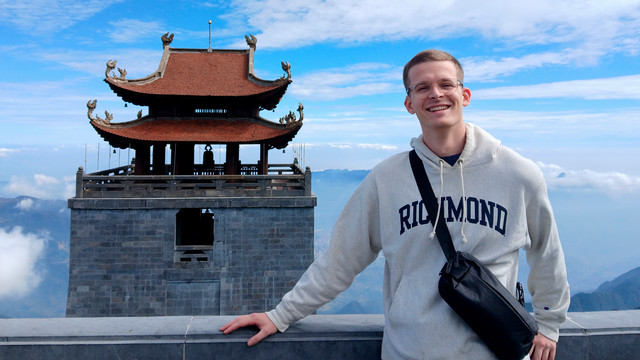Boren Scholar stresses the importance of studying abroad
Alumni
When Eli Chancey first arrived at the University of Richmond in fall 2020 from his hometown of Charlottesville, international travel was the last thing on his mind. It was the height of the pandemic, and his first year felt quiet and constrained.
Then one class changed everything — an introduction to an international relations course taught by Stephen Long, associate professor of political science and global studies. “That class opened my eyes to the broader world,” Chancey said, “and made me want to keep exploring.”
A string of study abroad experiences ensued, with each taking him farther from home. A summer in Copenhagen studying European Union policy gave him his first taste of living in another country and connected him with other students whose pandemic experiences mirrored his own. The following year, he lived with a host family in La Rochelle, France, immersed in daily French conversations. Later, he spent a semester in Prague learning about the history of communism in the Czech Republic and EU-U.S. relations.
“I agreed with myself after that first summer abroad that I was going to pursue the two things I loved most, international relations and studying abroad,” Chancey said. “Each experience built on the last and gave me the confidence to keep going farther.”
That confidence eventually took him halfway across the world as a Boren Scholar, part of a U.S. government–funded program that places students in immersive language study critical to national security. In 2024–25, Chancey joined the first-ever Vietnam cohort, spending eight months — and hours each day in the classroom — learning Vietnamese in Hanoi and Ho Chi Minh City.
“I had no experience with Vietnamese,” said Chancey, who deferred his graduation to 2025 to remain eligible for the program as an active undergraduate. “If I was going to live anywhere for a year, why not Vietnam? It felt like jumping in the deep end.”
He began with two months of intensive training at the University of Wisconsin before moving to Hanoi, where he lived with a host family and studied at Vietnam National University.
“My host grandmother was about 4 foot 6, and I’m 6 foot 6,” he said. “People would stop and laugh at us walking together. But my family was wonderful. They took me on trips around Northern Vietnam and introduced me to food I never thought I’d try, like duck blood soup and silkworm larvae. I can't say those dishes won me over, but I'm glad I tried them. There were many other Vietnamese dishes that I loved.”
Later, he moved south to Ho Chi Minh City, where he took one-on-one language classes, played pickleball with teachers and expats, and explored Southeast Asia on visa runs. “Some of my Vietnamese teachers were the best I’ve ever had — truly some of the kindest people who cared so much about our learning,” said Chancey.
I want to make Richmond feel like home for our international students the way my host families and teachers helped me feel at home abroad.”
Tapping into his own experience
Back in Richmond now, Chancey is applying those lessons in his new role as global engagement fellow at UR’s Center for Global Engagement, where he supports international students as they adjust to campus and American culture. In the one-year post, he will help organize events, write the international student newsletter, and make himself available to talk about culture shock, integration, or just everyday life.
“Having been an international student myself, I understand what it feels like to be in a new place where everything is unfamiliar,” he said. “I want to make Richmond feel like home for our international students the way my host families and teachers helped me feel at home abroad.”
Chancey’s academic path is as wide-ranging as his travels. He graduated as a triple major, with degrees in political science, French, and mathematics. The mix, he admits, sometimes surprises people. “The math gets forgotten,” he said, “but I did game theory research on cyberattacks one summer. I just kept taking the next class in math and French, and eventually it all added up to three majors.”
Looking back, Chancey credits UR’s culture of global engagement for making it all possible. “Richmond gave me so many opportunities to go abroad and supported me in making it work with my academics, even as a triple major,” he said. “If I could study abroad, anyone can. I encourage other students to look into it, even if you don’t think it’s for you. Each time, I found it more challenging and more rewarding.”
For now, Chancey is keeping up his Vietnamese through weekly virtual lessons with one of his teachers in Ho Chi Minh City, supported through scholarship hours he earned recording words in English for the program. He also practices his language skills by interacting with students from Vietnam, which represents Richmond’s second-largest group of international students.
Chancey is considering graduate school in international relations and, eventually, a career in diplomacy or foreign service, as the Boren program requires participants to commit to government service afterward. In the meantime, he’s exactly where he wants to be, as he helps international students at Richmond find the same sense of belonging he discovered abroad.
“It’s been a whirlwind 15 months,” he said. “But I’m really happy to be back at Richmond, giving back to a community that gave me so much.”

